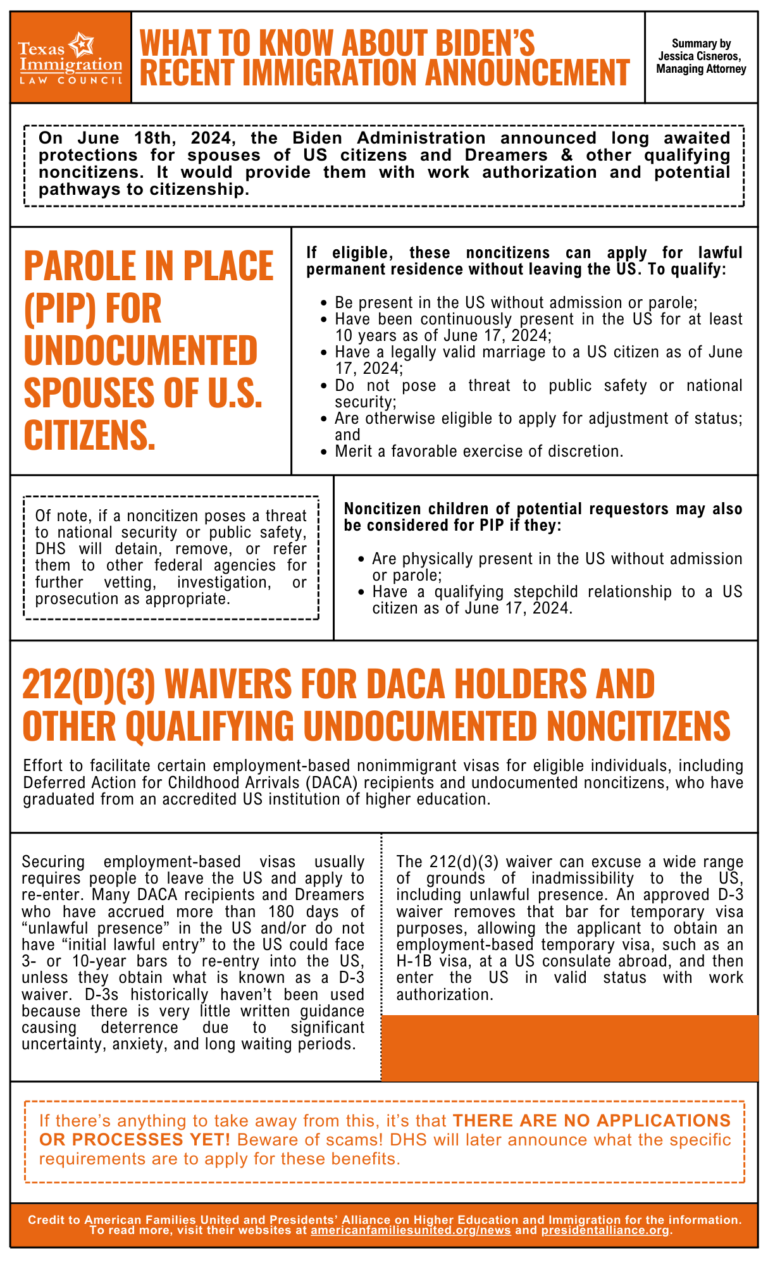On June 18, 2024, the Biden administration announced long awaited protections for spouses of United States citizens and Dreamers and other qualifying noncitizens. It would provide them with work authorization and potential pathways to citizenship.
1. Parole in Place (PIP) for Undocumented Spouses of U.S. Citizens. If eligible, these noncitizens can apply for lawful permanent residence without leaving the U.S. To qualify:
- Be present in the U.S. without admission or parole;
- Have been continuously present in the U.S. for at least 10 years, as of June 17, 2024;
- Have a legally valid marriage to a U.S. citizen, as of June 17, 2024;
- Do not pose a threat to public safety or national security;
- Are otherwise eligible to apply for adjustment of status; and
- Merit a favorable exercise of discretion.
Of note, if a noncitizen poses a threat to national security or public safety, the U.S. Department of Homeland Security (DHS) will detain, remove, or refer them to other federal agencies for further vetting, investigation, or prosecution as appropriate.
Noncitizen children of potential requestors may also be considered for Parole in Place (PIP) if they:
- Are physically present in the U.S. without admission or parole;
- Have a qualifying stepchild relationship to a U.S. citizen, as of June 17, 2024.
2. 212(d)(3) waivers for DACA holders and other qualifying undocumented noncitizens. Effort to facilitate certain employment-based nonimmigrant visas for eligible individuals, including Deferred Action for Childhood Arrivals (DACA) recipients and undocumented noncitizens, who have graduated from an accredited U.S. institution of higher education.
- Securing employment-based visas usually requires people to leave the U.S. and apply to re-enter. Many DACA recipients and Dreamers who have accrued more than 180 days of “unlawful presence” in the U.S. and/or do not have “initial lawful entry” to the U.S. could face 3- or 10-year bars to re-entry into the U.S., unless they obtain what is known as a D-3 waiver. D-3s historically haven’t been used because there is very little written guidance causing deterrence due to significant uncertainty, anxiety, and long waiting periods.
- The 212(d)(3) waiver can excuse a wide range of grounds of inadmissibility to the U.S., including unlawful presence. An approved D-3 waiver removes that bar for temporary visa purposes, allowing the applicant to obtain an employment-based temporary visa, such as an H-1B visa, at a US consulate abroad, and then enter the US in valid status with work authorization.
If there’s anything to take away from this, it is that THERE ARE NO APPLICATIONS OR PROCESSES YET! Beware of scams! DHS will later announce what the specific requirements are to apply for these benefits.
Credit to American Families United and Presidents’ Alliance on Higher Education and Immigration for the information. To read more, visit their websites at americanfamiliesunited.org/news and presidentalliance.org.


